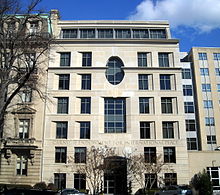Carnegie Endowment for International Peace

The Endowment's headquarters located at 1779 Massachusetts Avenue, NW in Washington, D.C.
|
|
| Motto | The Global Think Tank |
|---|---|
| Formation | 1910 |
| Type | International Relations Think Tank |
| Headquarters | 1779 Massachusetts Ave, NW, Washington D.C. |
| Location | |
|
President
|
William J. Burns |
| Website | www.carnegieendowment.org |
The Carnegie Endowment for International Peace is a foreign-policy think tank with centers in Washington, D.C., Moscow, Beirut, Beijing, Brussels, and New Delhi. The organization describes itself as being dedicated to advancing cooperation between nations and promoting active international engagement by the United States. Founded in 1910 by Andrew Carnegie, its work is not formally associated with any political party.
In the University of Pennsylvania's 2015 Global Go To Think Tanks Report, Carnegie is ranked the third most influential think tank in the world, after the Brookings Institution and Chatham House.
Its headquarters building, prominently located on the Embassy Row section of Massachusetts Avenue, was completed in 1989 on a design by architecture firm Smith, Hinchman & Gryll. It also hosts the embassy of Papua New Guinea in the U.S.
The President of Carnegie's Board of Trustees is Harvey V. Fineberg.
Andrew Carnegie, like other leading internationalists of his day, believed that war could be eliminated by stronger international laws and organizations. "I am drawn more to this cause than to any," he wrote in 1907. Carnegie's single largest commitment in this field was his creation of the Carnegie Endowment for International Peace.
On his seventy-fifth birthday, November 25, 1910, Andrew Carnegie announced the establishment of the Endowment with a gift of $10 million worth of first mortgage bonds, paying a 5% rate of interest. The interest income generated from these bonds was to be used to fund a new think tank dedicated to advancing the cause of world peace. In his deed of gift, presented in Washington on December 14, 1910, Carnegie charged trustees to use the fund to "hasten the abolition of international war, the foulest blot upon our civilization", and he gave his trustees "the widest discretion as to the measures and policy they shall from time to time adopt" in carrying out the purpose of the fund.
...
Wikipedia
